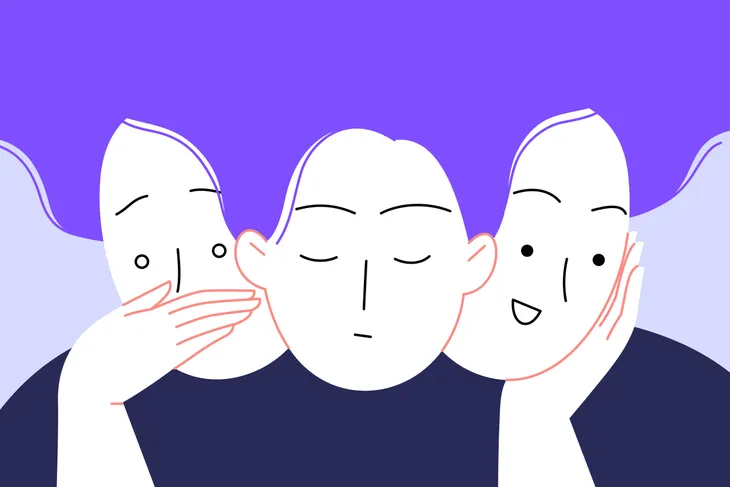- Cyclothymia is a mood disorder, similar to bipolar disorder in that it causes frequent mood swings, but cyclothymia tends to be milder.
- Symptoms don’t improve on their own so it’s important to get a proper diagnosis and treatment plan.
- Cyclothymia is also a chronic condition that requires lifelong treatment. It’s vital to follow your treatment plan even during periods of stable moods because symptoms will return.
Individuals with cyclothymia suffer from frequent mood swings. Sometimes they’ll experience hypomanic episodes like extreme optimism while other times they’ll experience depressive episodes and feel sad and hopeless. Cyclothymia can interfere with your daily life and it doesn’t improve without treatment.
The best thing you can do for a loved one who is suffering from cyclothymia is to get informed. Individuals with the disorder don’t always seek out treatment on their own so it’s important to have open and honest discussions in hopes to get them the help they need. Here’s a look at what cyclothymia is, the common warning signs to watch for, and what to do about it.
What Is Cyclothymia (Cyclothymic Disorder)?
Cyclothymia, also known as a cyclothymic disorder, is a mood disorder. It’s similar to bipolar disorder in that it causes frequent mood swings, but cyclothymia tends to be milder. It’s also considered rare but the symptoms often overlap with other mental health conditions so the Cleveland Clinic says researchers believe it may be “considerably underdiagnosed and misdiagnosed.”
Healthline explains that the disorder is characterized by fluctuating low-level depressive symptoms accompanied by periods of mild mania. To receive a diagnosis, the source says symptoms must be present for at least 2-years in adults and 1-year in children and teenagers.
Warning Signs of Cyclothymia
Frequent mood swings are the telltale sign of cyclothymia. This means the individual will alternate between emotional highs and lows. The emotional highs are known as hypomanic symptoms, which cause an elevated mood whereas the lows are known as mild or moderate depressive symptoms.
The Mayo Clinic points out that though the symptoms are similar to bipolar I and II disorder, cyclothymia symptoms are less severe. Individuals can often function, however, their mood swings are often unpredictable which can disrupt their daily life.
The Common High and Low Symptoms of Cyclothymia
According to the Mayo Clinic, hypomanic symptoms can be displayed as extreme optimism, inflated self-esteem, talking more than usual, exaggerated feelings of happiness, racing thoughts, agitated behavior, excessive physical activity, decreased need for sleep, tendency to be distracted, increase drive to achieve goals, and an inability to concentrate.
The following are examples of extreme lows (depressive symptoms):
- Irritability
- Feel sad or hopeless
- Tearfulness
- Changes in weight
- Feeling worthless or guilty
- Loss of interest in activities that are normally enjoyed
- Sleeping problems
- Fatigue
- Difficulty concentrating
- Restlessness
 fizkes / Shutterstock
fizkes / ShutterstockCyclothymic Disorder vs. Bipolar Disorder: What’s the Difference?
After understanding the signs and symptoms of cyclothymic disorders, it’s easy to see how it’s so similar to bipolar disorder. So you might be wondering, what sets the two disorders apart? According to Healthline, the main difference is the severity of the symptoms and the pattern of mood shifts.
The source explains that Bipolar I and II tend to cause more serious and alarming symptoms, which cause people to reach out for help. The hypomanic, manic, and depressive episodes also tend to last for days or weeks at a time. Cyclothymia, on the other hand, tends to present less severe symptoms and the episodes are usually short-lived. This is also why it can often go undiagnosed because symptoms can often be “mistaken for general moodiness” or a personality disorder, explains the source.
What Causes Cyclothymia?
Unfortunately, the exact cause of cyclothymia is unknown. That said, the Mayo Clinic says research shows it’s likely a combination of factors. For starters, it may be genetic as the disorder tends to run in families.
The source also notes that changes in the brain’s neurobiology may also play a role in the development of the disorder. As can environmental problems like traumatic events or prolonged periods of stress.
Who’s at Risk?
Cyclothymia is rare, affecting roughly 1-percent of the population in the United States, says the Cleveland Clinic. However, as we mentioned, it’s possible that these numbers are inaccurate as the disorder often goes undiagnosed or misdiagnosed as another mood disorder. But who’s at risk?
The Mayo Clinic says the disorder typically starts during teenage years or young adulthood. It also is equally common in men and women.
When to See a Doctor
If you’re showing signs of cyclothymia then contact your doctor as soon as possible. The Mayo Clinic says symptoms don’t usually improve on their own and there’s a risk of it developing into bipolar disorder. So, it’s incredibly important to get a proper diagnosis and treatment plan.
Sometimes individuals are hesitant to reach out for medical help. The source suggests confiding in someone you trust that can help you take the first step. In contrast, if you notice a loved one displaying symptoms of the disorder try to talk openly and honestly with them. You can’t force anyone to get professional help but you can offer them support.
How Is Cyclothymia Diagnosed?
To confirm a diagnosis, your doctor will need to rule out other mental illnesses like bipolar I or II disorder, depression, or any other underlying condition that could be causing your symptoms. To do this, your doctor will likely start with a physical exam. The Mayo Clinic says some lab tests may be necessary.
The source says the next step will likely be a psychological evaluation. This may involve answering a series of questions to provide your doctor insight into your thoughts, feelings, and behavior patterns. Allowing your family or close friends to provide insight to your doctor can be helpful too.
Finally, the source also notes your doctor may request mood charting, which involves keeping a daily record of your moods, sleep patterns, and other factors that can help confirm a diagnosis.
The Diagnostic Criteria of Cyclothymia
The Mayo Clinic points out that your doctor will use the Diagnostic and Statistical Manual of Mental Disorders (DSM-5), published by the American Psychiatric Association to help confirm a diagnosis. According to the DSM-5 to meet a cyclothymia diagnosis, you must have the following:
- You’ve had many periods of hypomanic and depressive symptoms for at least 2-years (1-year for children and teenagers).
- During that 2-year period, the episodes have been present for at least half that time.
- Periods of stable moods usually last less than 2-months.
- Symptoms significantly affect you (at work or school, socially, or in other important areas of your life).
- Symptoms don’t meet the criteria for other mental disorders like bipolar disorder or major depression.
- Symptoms aren’t caused by another medical condition or substance use.
How Is Cyclothymia Treated?
Once a diagnosis is confirmed, your medical team will determine the best treatment plan for you. The Mayo Clinic says there is currently no medication approved by the Food and Drug Administration (FDA) specifically for cyclothymia, however, your doctor may prescribe medication used for bipolar disorder. The goal of medication is to help control hypomanic and depressive symptoms.
It’s also important to note that cyclothymia is a chronic condition which means it requires lifelong treatment. Even if you experience periods of stable moods, it’s important to follow your treatment plan. Healthline notes that if you stop taking your medication, your symptoms will return. Along with medication, your doctor will also likely recommend psychotherapy and other lifestyle adjustments, which we’ll look into next.
Treatment: Psychotherapy
Psychotherapy is often an important part of treatment. Healthline says there are two primary types that help treat the disorder, including cognitive behavior therapy (CBT) and well-being therapy.
CBT is a type of talk therapy that helps identify negative beliefs and behaviors and helps you learn how to replace them with positive ones. CBT can also help you develop coping techniques.
The source explains that well-being therapy “focuses on improving overall quality of life rather than fixing specific psychological symptoms.” Your doctor may also recommend family or group therapy too.
Lifestyle Adjustments and Home Remedies
In addition to your medical treatment plan, your doctor may recommend lifestyle adjustments and home remedies. For starters, it’s incredibly important to take your medication as directed.
The Mayo Clinic also suggests paying close attention to your warning signs and addressing your symptoms before they get worse. One way you can do this is by keeping a record of your moods and daily routines. This can help you understand the effects of your treatment and identify any patterns and triggers.
Getting regular exercise is not only important for your overall health but it can also help stabilize your mood. But talk with your doctor before starting a new workout program. Finally, it’s important to invest in sleep as it plays an integral role in your mood. Get plenty of good quality sleep every day and try to stick to a regular sleep schedule. This means going to bed and waking up at the same time every day, even on weekends. If you’re struggling with sleep, talk to your doctor.
How to Cope
Receiving any medical diagnosis can be stressful and nerve-wracking for you and your family. And coping with cyclothymia can be a challenge. The Mayo Clinic says patients are often tempted to stop treatment when they feel better but it’s important to keep following your treatment plan. The source also says learning everything you can about the disorder can help you cope. It’s also important to educate your family and close friends about the disorder so they understand what you’re going through.
Joining a support group can also help you feel less alone. Finding healthy outlets like new hobbies and learning stress management techniques can also help you cope with the disorder. Never be afraid to reach out for help if you’re struggling.















